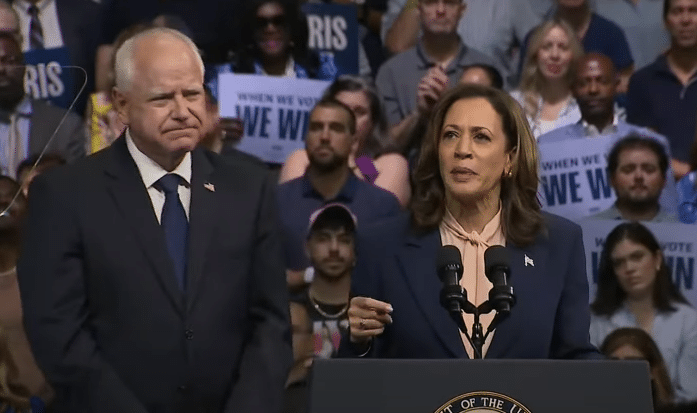Minnesota Democratic Governor Tim Walz had no answer for CBS News’ debate moderators for why “voters say they trust Donald Trump on the economy more” than Vice President Kamala Harris in his Oct. 1 debate with Ohio Republican Senator J.D. Vance. Walz chose to dodge the question and shift his answer to talking about tax, trade and manufacturing policies.
Trump’s advantage has been consistent in national surveys, for example, in the CNN national poll take Sept. 12 to Sept. 19 taken after the presidential debate, he led Harris 50 percent to 39 percent on the economy.
It might be something still mystifying Democrats even after all the votes are counted in November, but it’s actually quite simple. The economy stinks, and the American people know it in their hearts.
This has been a constant theme in the campaign: after peak annual inflation in June 2022 of 9.1 percent, the worst in 40 years, and incomes still have not caught up, a majority of Americans no longer trust President Joe Biden and Vice President Harris’ administration of the U.S. economy, and they see it getting worse.
This can easily be seen when consumer confidence is measured against inflation, showing a direct inverse relationship: The higher inflation goes, the worse consumer confidence gets, and then after, it takes a long while for confidence to be recovered.
Using the University of Michigan’s metric, consumer sentiment today is even lower today at 67.9 than when Jimmy Carter lost reelection to Ronald Reagan in 1980 at 76.7, much lower than when Reagan was reelected in 1984 at 95.7 and George H.W. Bush won in 1988 at 93, lower than 1992 when Bush lost reelection to Bill Clinton at 85.3, lower than 2004 when George W. Bush won reelection at 92.8, lower than 2012 when Barack Obama was reelected at 82.7 and lower than 2020 when Donald Trump barely lost reelection to Biden with sentiment at 76.9.
In fact, by Aug. 2021, when inflation had already climbed above 5 percent and was eating into household budgets, still a month before the botched U.S. military withdrawal from Afghanistan that threw the country into chaos and let the Taliban take over — it also contributed to an overall drop of approval for Biden but that was not the singular cause of Biden and Harris’ decline — both Biden and Harris were upside down on the economy, and as inflation worsened, so did voter approval of the administration’s handling of the economy.
From Jan. 2021 through July 2021, Biden had a 52 percent approval rating on the economy and a 42 percent disapproval rating on the economy, according to the RealClearPolling.com average of national polls. In Aug. 2021, it turned negative, with 48 percent disapproving and 46 percent approving.
From there it was all downhill, with inflation rising to 6.2 percent in Oct. 2021, 6.8 percent in Nov. 2021, 7.1 percent in Dec. 2021 and 7.5 percent by Jan. 2022, a month before Russia invaded Ukraine.
From Sept. 11, 2021 through the end of Jan. 2022, Biden’s disapproval on the economy worsened to an average of 52 percent, with only 40.6 percent approving.
From the start of Russia’s invasion of Ukraine in Feb. 2022 through peak inflation in June 2022, the Biden-Harris administration’s approval only worsened, with disapproval rising to an average of 56.9 percent and approval down to 37.6 percent.
After that, it has barely recovered, with disapproval averaging 56.4 percent since peak inflation and approval 39.7 percent approving through present.
Most recently, and what might matter the most with the election just a month away and early voting beginning now, since September, 56.4 percent disapprove of the administration’s handling of the economy and only 40.8 percent approve. That’s crappy. But does it rub off on Kamala Harris after Joe Biden was removed from the Democratic ticket?
So far, the answer has been yes, when Harris is juxtaposed with Trump in who would do a better job handling the economy, with Trump consistently leading by double digits. Incomes were rising far faster than inflation during the Trump years, and voters remember, and that made it an insurmountable race for Biden and still a really tough race for Harris.
Harris could still win with swing state polls very tight, but that is owed to her representing the incumbent White House party, the Democrats, in their first term, and first term incumbent parties win about 66.6 percent of the time regardless of the nominee.
As much as Harris benefits from the incumbency advantage, though, that also means she bears the burden of incumbency when voters consider the state of affairs, especially their personal finances and the economy.
As Jame Carville famously quipped in 1992, “It’s the economy, stupid!” and so far, after two debates by Harris and Walz to make their case for continuing the policies of the current administration, Democrats still have no answer. Is it too late?
Robert Romano is the Vice President of Public Policy at Americans for Limited Government Foundation.









